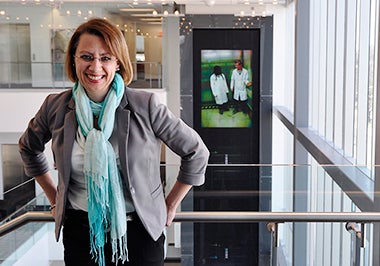During CBC radio's recent Cross Country Checkup discussion on how reading is changing, guest commentator on the program, Christine McWebb, programs director at Stratford Campus and French Studies professor, discussed the different ways in which digital technology affects us. She told Checkup guest host Randy Boyagoda why digital tools are making linear reading a lost skill and changing the way we think.
Randy Boyagoda: Is the way we read really changing?

RB: Now a moment ago, we had guy from Toronto taking us back to the origin moment for digital books in Toronto. I'd like you to take us back a little further. Take us back to the printing press revolution. How complicated was that technological shift in comparison with the one we're experiencing today?
CM: When I listen to the people on the show, it's interesting to see that we really live in the immediate, and we look at what's happening all around us and how we cope with transitions and technology.
But of course, we have to keep in mind that technological revolutions have happened before and the switch from the Codec — the handwritten manuscript in the Middle Ages — to the printing press was one of those changes. I would say it was pretty complicated and complex.
It also had consequences on reading speed and distribution of information and things like that. It really took us out of the local environment and into a much broader environment. I wouldn't say necessarily globally, but certainly across Europe at the time.
RB: Now what changes have you seen in your students' reading styles and habits?
CM: I've been teaching for almost 20 years now and I would say that some of the previous callers have said that students do find it hard to do extensive research. I find that has definitely changed. They like to go to the results immediately. So, they put in their search phrases on Google and they go directly to, let's say a certain paragraph, and skip the rest of the article because it may not be relevant to what they're doing.
In terms of reading habits in general, I teach an introductory course on digital culture and we had a debate about this very topic — the topic of the show today. It was really interesting to hear that most students, [who are] about 18 to 19 years old, prefer to read paper books.
RB: Interesting!
CM: Yeah, and I found that very interesting because my own experience is that when I read for pleasure, I actually read on my Kindle app on my iPad.
RB: Did any of the students volunteer why they prefer the paper books?
CM: Yeah, they said that when they read electronically, online particularly, they feel that they are distracted. And so, they self-discipline in a way and they shut down the phone and they shut down their computer and they just read their novels. Now this is not all of them of course, but I have to say that there were a lot of students who shared that opinion.
RB: I'm curious. Based on your research, based on your own work, on your engagement with your students… is linear reading becoming a lost skill?
CM: I would say yes, in my view it is, because as we move more and more into digital technology and as digital technology becomes more and more refined, I really do believe that digital technology is changing the way we think and that linearity perhaps turns more into network thinking.
What I mean by that is what a lot of people call "jumping around." So, [going from] Facebook, back to your article, back to your book, and to a site... it changes the way we approach reading and changes the way we approach problem solving and things like that. I think we've become more collaborative and more networked in our reading habits.
Read this story and listen to the interview on the CBC website.